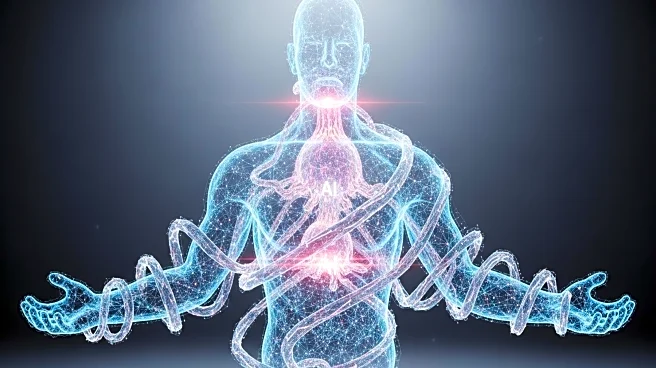What is the story about?
What's Happening?
The University of Texas MD Anderson Cancer Center has launched the Institute for Data Science in Oncology (IDSO) to integrate advanced data science and artificial intelligence (AI) into cancer care and research. The initiative aims to develop 'digital twins'—virtual models of patients and their tumors—to simulate disease progression and treatment responses. Caroline Chung, chief data and analytics officer at MD Anderson, emphasizes the importance of defining problems before applying technology solutions. The IDSO collaborates with academic partners like Rice University and the Texas Advanced Computing Center to accelerate cancer therapy discovery through platforms like Cansar.ai. The institute focuses on five areas, including quantitative analysis of pathology and medical imaging data, spatial mapping of gene expression, and computational modeling to guide personalized treatments.
Why It's Important?
The integration of AI and data science into cancer care represents a significant shift in medical practice, potentially improving patient outcomes by tailoring treatments to individual needs. By using digital twin technology, clinicians can predict treatment responses without administering doses, reducing side effects and enhancing precision in therapy. This approach could revolutionize cancer treatment, offering more personalized and effective care. The collaboration between MD Anderson and other academic institutions fosters innovation and accelerates the discovery of new therapies, potentially benefiting patients globally. The initiative also addresses the frustration among researchers regarding the lack of real-world application of their work, providing a direct pathway to impact.
What's Next?
MD Anderson's IDSO plans to continue embedding data science researchers across clinical departments and expand its fellowship program to train clinicians and data scientists collaboratively. The institute aims to leverage machine learning to predict surgical complications and improve clinical outcomes. As the technology matures, the goal is to achieve global impact by transforming medical practice and integrating AI into clinical workflows. This cultural shift requires agility in clinical processes to maximize technology benefits, potentially setting a precedent for other medical institutions worldwide.
Beyond the Headlines
The use of digital twins in cancer care raises ethical considerations regarding data privacy and the accuracy of AI predictions. As the technology evolves, ensuring patient data security and addressing biases in AI models will be crucial. The initiative also highlights the need for interdisciplinary collaboration, bridging gaps between data science and clinical practice. This cultural shift could redefine success in medical research, emphasizing real-world impact over academic publication.















